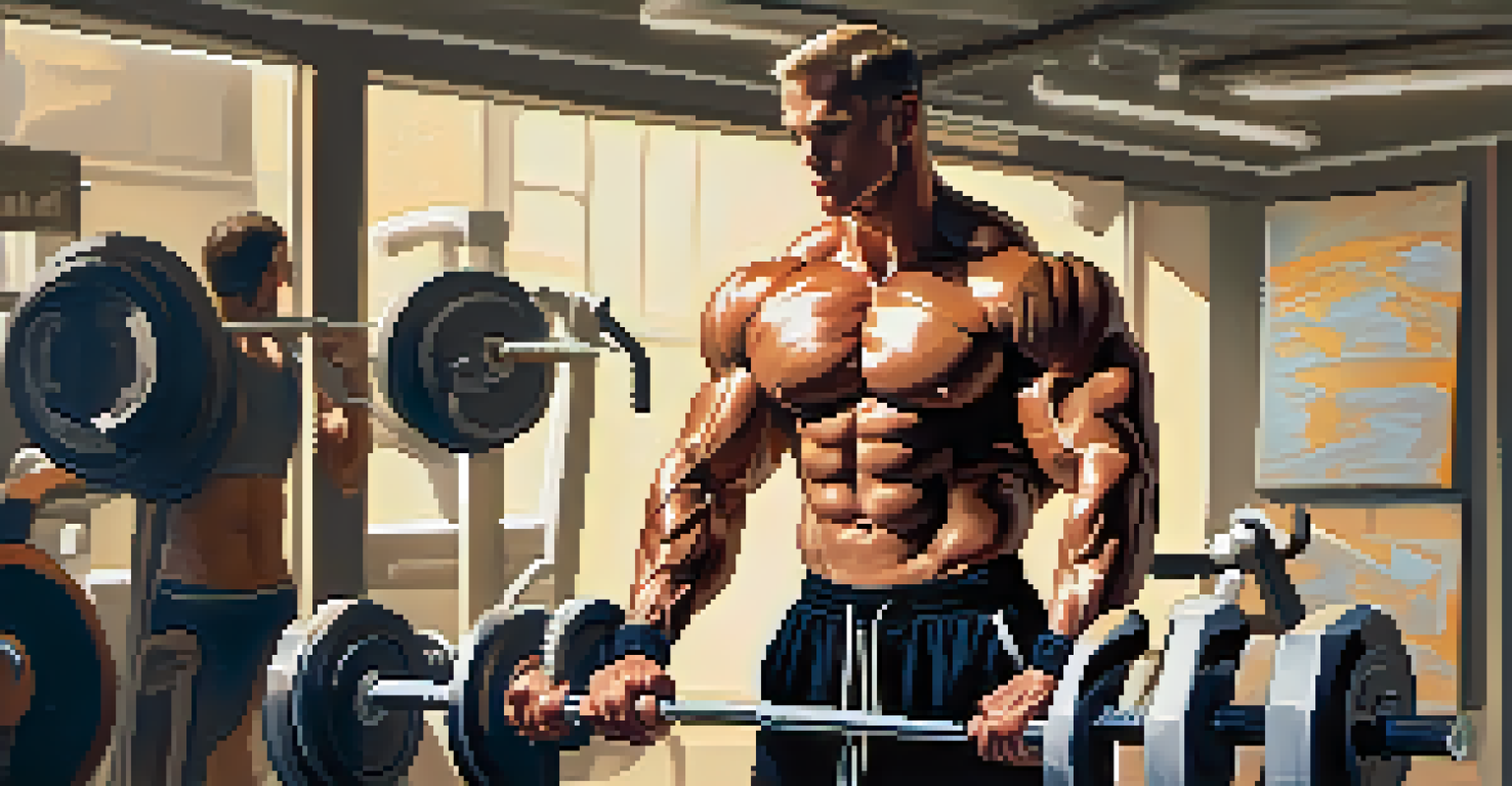Nutrition Tips for Bodybuilders and Healthy Living

Understanding Your Nutritional Needs as a Bodybuilder
As a bodybuilder, your nutritional needs are different from the average person. You require a balanced intake of macronutrients, including proteins, fats, and carbohydrates, to support muscle growth and recovery. For instance, a common guideline is to aim for about 1.2 to 2.2 grams of protein per kilogram of body weight daily, depending on your training intensity.
You are what you eat, so don’t be fast, cheap, easy, or fake.
In addition to proteins, fats are essential for hormone production, while carbohydrates serve as your primary energy source. This means that understanding your body’s specific needs can help you tailor your diet effectively. Think of your body as a car; without the right fuel, it simply won’t perform at its best.
Tracking your daily intake can be helpful, especially in the early stages of your bodybuilding journey. Tools like food diaries or mobile apps can make this process easier and more insightful, allowing you to make informed adjustments as you progress.
The Importance of Protein for Muscle Growth
Protein is often referred to as the building block of muscle. It plays a crucial role in repairing and building muscle tissues after a workout. Foods like chicken, fish, eggs, and legumes are excellent sources of protein that can help you meet your daily requirements.

Incorporating protein into every meal can ensure a steady supply of amino acids, which are vital for muscle repair. For example, starting your day with a protein-rich breakfast, like Greek yogurt with nuts, can set a positive tone for your nutrition throughout the day.
Nutritional Balance is Key
Bodybuilders need a balanced intake of proteins, fats, and carbohydrates to support muscle growth and recovery.
Additionally, timing your protein intake around your workouts can enhance recovery. Consuming a protein shake or a high-protein snack post-exercise can help kickstart muscle repair, making it a smart strategy for any bodybuilder.
Healthy Carbohydrates: Fuel for Your Workouts
Carbohydrates often get a bad rap, but they are essential for bodybuilders, particularly for fueling intense workouts. They provide the energy needed to push through those heavy lifts and long training sessions. Opting for complex carbohydrates, like whole grains, fruits, and vegetables, can provide sustained energy throughout the day.
Proper nutrition is the key to success in any sport, including bodybuilding.
Consider carbohydrates as the gas that powers your engine. Without sufficient fuel, your performance can falter, leading to fatigue and diminished returns on your workout efforts. A simple pre-workout meal like oatmeal with bananas can supply the necessary energy for your training.
Post-workout, it’s vital to replenish your glycogen stores with carbs. Pairing protein with carbohydrates in your post-workout meal can help with recovery and muscle growth, setting you up for success in subsequent workouts.
Healthy Fats: Essential for Hormone Production
Healthy fats are often overlooked in bodybuilding nutrition, yet they play a crucial role in hormone production, including testosterone, which is vital for muscle growth. Sources like avocados, nuts, seeds, and olive oil should be included in your diet to ensure adequate fat intake.
Think of fats as the oil that keeps the machinery running smoothly. Without sufficient healthy fats, your body may struggle to produce the hormones needed for muscle repair and growth. Incorporating a handful of nuts into your daily snacks can be an excellent way to boost your healthy fat intake.
Protein Timing Enhances Recovery
Incorporating protein into meals, especially post-workout, is essential for effective muscle repair and growth.
Also, consuming omega-3 fatty acids, found in fatty fish like salmon, can reduce inflammation and improve recovery times. This means that adding these foods to your meal plan not only supports hormone health but also enhances your overall performance.
Hydration: The Often-Overlooked Key to Performance
Hydration is critical for everyone, but it’s especially important for bodybuilders. Dehydration can lead to decreased performance, increased fatigue, and slower recovery times. Aiming for at least 3 liters of water a day is a good starting point, but this can vary based on your activity level and climate.
Consider hydration as the coolant in your engine; without it, things can overheat quickly. Drinking water before, during, and after workouts can help maintain optimal performance levels. You can also include hydrating foods like watermelon and cucumber in your diet to boost your fluid intake.
Monitoring your hydration status can be as simple as checking the color of your urine. A pale yellow indicates good hydration, while darker shades suggest it might be time to drink more water. Staying ahead of your hydration game can significantly impact your training outcomes.
Meal Timing: When to Eat for Optimal Performance
Meal timing can play a significant role in maximizing your bodybuilding efforts. Eating at regular intervals, ideally every 3-4 hours, helps maintain energy levels and supports muscle repair. This approach can prevent excessive hunger and keep your metabolism active.
Imagine your body as a campfire; regular feeding of the fire keeps it burning brightly. Skipping meals or waiting too long can lead to energy crashes and hinder your performance. Planning out your meals and snacks ahead of time can help you stay on track.
Hydration Supports Performance
Staying hydrated is crucial for bodybuilders as it impacts performance, recovery, and overall training outcomes.
Pre- and post-workout meals are especially crucial. A balanced meal or snack containing protein and carbohydrates before a workout can enhance performance, while post-workout meals should focus on recovery. This strategic timing can make a noticeable difference in your bodybuilding progress.
Supplements: Do You Really Need Them?
Supplements can be a helpful addition to your nutrition plan, but they shouldn’t replace whole foods. While protein powders and creatine can support muscle growth and recovery, it’s essential to prioritize getting most of your nutrients from a balanced diet filled with whole foods.
Think of supplements as the icing on the cake; they can enhance your efforts but should never be the main ingredient. Before adding supplements, assess your diet to see if there are any gaps that need filling. Consulting with a nutritionist can provide personalized guidance tailored to your needs.

Ultimately, supplements are most effective when combined with a well-rounded diet and consistent training. They can help you reach your goals faster but should be viewed as a complement to your nutrition strategy, not a replacement.